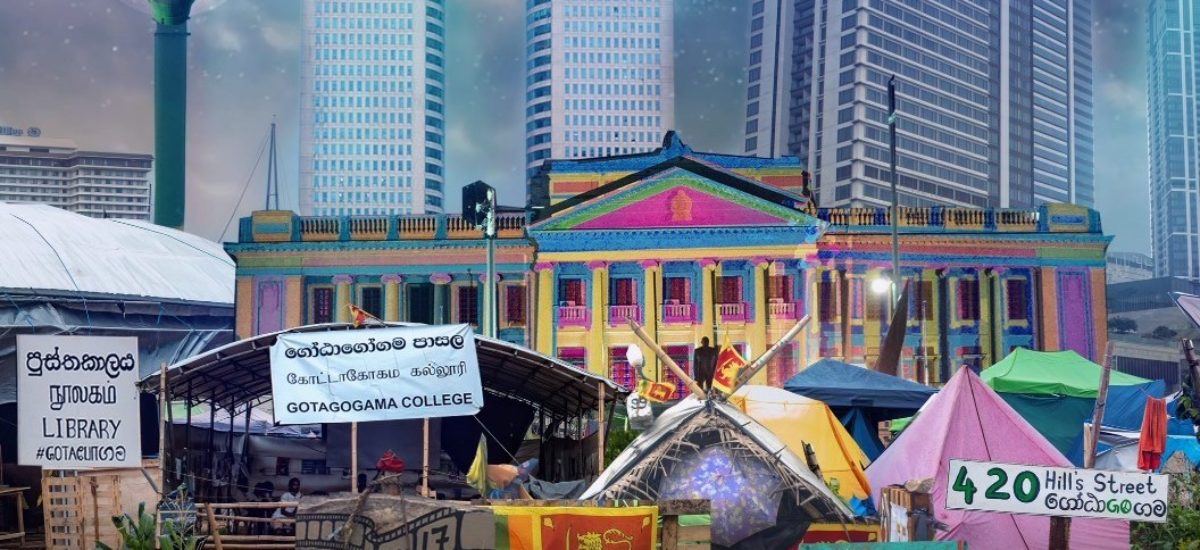There have been dark times in Sri Lanka in 2022. Economic anxiety and disruption of existing supply chains for the essential services of food, gasoline, petrol and electricity led to profound distress and disquiet in the country.
People still recovering from the terrorism that stalled the country’s progress for decades and then stricken by the Covid outbreak and the shutdowns of the global pandemic have been faced with the cumulative challenges of economic chaos.
A narrow focus on economic factors as measures of a people’s growth often results in humanitarian subjects like the arts being described as non-essential. Yet, in the midst of the anguish experienced by people in these difficult days, the solace of the human capacity for imagination, creativity and expression has shone brightly and kept hope alive for many of us. The brilliance of the human imagination is linked to the resilience necessary to continue to produce work, often in sharply adverse circumstances, and produce art that has lasting value in a time of profound cultural shock and erosion.
In late September, Sri Lanka’s first curated Non-Fungible Token (NFT) Digital Art Exhibition celebrated the ability of artists to distill the moment and express the spirit of the times, showcasing the work of 15 Sri Lankan artists working in diverse media. Protest, which is often misrepresented as solely destructive in media reports, is here seen as part of an individual’s right to creative expression and as a human response to the context in which an artist lives and works.
The process of making an expression of individual thought and feeling into an art object has been a fascinating one. In my case, the words of my poem ‘Adamant’ were recorded by me as a spoken text and tracked to a sequence of visual captions, so the words could be read as text as they unscrolled on screen and also heard simultaneously. The audio recording is the NFT, the artistic creation and the purchaser of the original work in my case were also given a printed text of the words as a gift. Each NFT is imprinted with a unique digital code that establishes its exclusivity, its value and authenticity.
The Brilliant Resilient exhibition is hosted on an international digital art platform called TheUpsideSpace (TUS) founded by Lisa Ray and Ayesha Khan.
The exhibition comprises diverse multi media pieces: paintings, audiovisual hybrid artworks, hard-edged impressionistic photographs, montages, a layered visceral performance piece and luminous superimpositions and visual juxtapositions of words and images – startling evocations of dark humour and semi-jocular satire as well as searing pain.
TheUpsideSpace is a curator-led digital arts platform that spotlights artistic expressions from Southeast Asia, South Asia and the Middle East. Its mission is to build a thriving creative ecosystem of art enthusiasts, new audiences, existing collectors and artists from untapped geographies in one place. The Brilliant Resilient exhibition was curated by Kesara Ratnavibhushana, who worked with dedication, insight and patience with each artist to bring each iconic individual artwork into its own, as part of the collective expression of the project.
We see cultural symbols re-visioned and stereotypes and mythologies interrogated. We see cityscapes contrasted with the green resilience of nature, which is being eroded by human greed. We see human beings like moving shadows and silhouettes against natural resources and sources of security and happiness, which are shown today to be terrifyingly exhaustible. A man is stubbornly growing plants in broken, empty plastic bottles in Aamina Nizar’s ‘Green Resilient’.
When we open the link and view the exhibition on TheUpsideSpace, I suggest we examine each work from multiple angles and perspectives and note what is in the centre of each image, both visual and verbal – turn on the audio, note what is in the foreground, what is in the background, what inhabits the margins, what is in sharp focus, what is blurred, and what is felt as well as seen and heard in these images. What reaches out to us. What the multi sensory visual sequencing in Anoma’s digitized work, for example, shows us. What our eyes and our minds selectively focus on. The bigger picture beyond our biases and assumptions, our underlying humanity being touched and impacted, deeper than can ever be reached by the shallowness and sensationalism of the daily news media.
This collective body of work explores themes from beyond the immediate body-politic that emerged into focus this year ranging from LGBTQI+ rights to notions of environmental degradation – reflective of the eclecticism of the exhibition and of the conviction of its artists.
Note the titles, evocative and symbolic in themselves, including: ‘Darkness That Brings Light’ by Aadithya Jayaseelan, ‘Density’ and ‘Green Resilient’ by Aamina Nizar, ‘I Hear These Voices That Cannot Be Drowned’ by Anoma, ‘What We Should Eliminate’ by Anupa Perera, ‘National Pride’ by Kesara Ratnavibhushana, ‘Adamant’ by Devika Brendon and ‘Resistance’ by Anoli Perera. Vasi Samudra Devi’s ‘Hormone Replacement Crisis’ is a very direct statement on her personal and societal angst.
It is a living record of a time and a place, made tangible in real time.
The curator notes that “NFTs are a vehicle for artistic expression. And being digital, they have lasting, democratised value as spaces like TUS work to truly realise the longevity of blockchain technology and the possibilities thereof”. Some artists have chosen to offer physical works with the NFTs thus amplifying the dexterity of phygital work.
Seven primarily digital only artworks have been procured by collectors at the pre-sale.
The resonance of the art itself is enhanced for investors in the act of assisting Sri Lankan creatives/creative industries in the Sri Lankan diaspora around the world.
Enter TheUpsideSpace:
Press Play.
www.theupsidespace.com
https://www.instagram.com/theupsidespace/
Twitter @TheUpsideSpace
TheUpsideSpace


